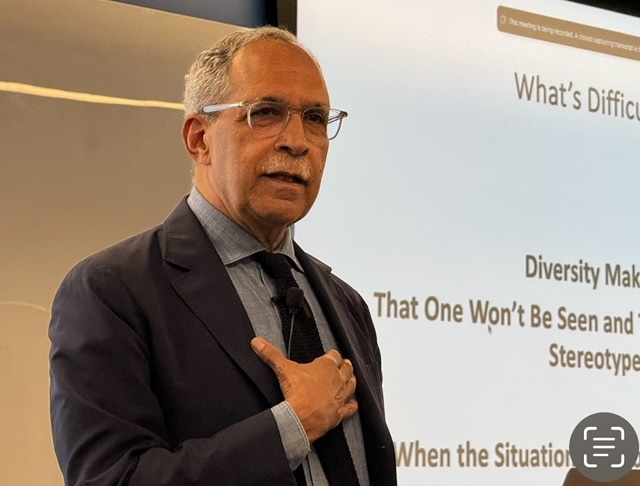Claude M. Steele, Ph.D., professor of psychology at Stanford University, visited the BME Department on April 4 as part of the BME 500 Seminar Series. He also met with students for a conversation over lunch and shared early insights about building trust from his forthcoming book in a presentation he calls “Churn: Life in the Increasingly Diverse World of Higher Education and How to Make It Work.”
The author of Whistling Vivaldi: How Stereotypes Affect Us and What We Can Do, Dr. Steele is renowned for his research on stereotype threat and its application to the academic performance of underrepresented students. U-M’s BME and Psychology Departments co-hosted this special seminar with support from a Faculty DEI Grant from the College of Engineering (to BME Assistant Professors Alexandra Piotrowski-Daspit and Aaron Morris). The seminar was followed by an afternoon reception.
Dr. Steele’s presentation had an additional significance for BME, since the department’s DEI Book Club had read Whistling Vivaldi as its inaugural selection. During this book club meeting, members discussed how to implement strategies from Whistling Vivaldi within the BME Department. Several key takeaways have sparked effort towards a more inclusive and affirming BME community.
During his presentation, Dr. Steele highlighted his concept: when two people, or groups of people, each with their contingencies of identity, are attempting to communicate across differences, there is a lot going on cognitively, affectively, and emotionally in the situations.
Churn is the worry about how one’s identity, in light of all of this context, plays out in the subjective experience of a diverse situation. To Steele, this “identity churn” is a “huge part” of the challenge of diversity, and trust is the critical issue in the functioning of our institutions.
Dr. Steele asks: “How can we build successfully diverse universities in which people feel they can contribute from the standpoint of their backgrounds and identities, and yet not be discriminated against based on those backgrounds and identities?”
Dr. Steele’s presentation resonated with faculty, staff and students. Alexandra (Alex) Piotrowski Daspit, who is leading the BME DEI Book Club with Aaron Morris, expressed her excitement for this special event: “this was a timely and especially motivating seminar for us in BME, where we are trying to foster the kinds of ‘beloved communities’ that Dr. Steele described.” Another book club participant, BME Lecturer Elizabeth (Lizzy) Mays, Ph.D. said: “This book described exactly the struggles I felt as an undergrad and put words to them. It also provided possible solutions. As a faculty member, this book gives me hope we can prevent current students from ‘over-efforting’ and harming their learning and well-being.”
”I really appreciated the discussion on trust,” said BME student Anjali Chiravuri. “I felt that Dr. Steele brought up some really good points about things we often forget, especially in this day and age, regarding the importance of trust. He highlighted ways we can develop trust interpersonally, on an individual level, institutionally, and everywhere in between. I liked that he reflected the optimism of being able to build those connections.”
“Dr. Steele provided me with a new perspective on the dynamics between different identity groups and how to build trust across gaps that have existed in different contexts throughout society,” added BME student Joel Pingel.
BME student Austin Cornish noted how the BME DEI Book Club has a direct connection to Thursday’s conversation: “Dr. Steele discussed the importance of building trust from the ground up, fostered at an institutional and organizational level, but executed at the level of individuals. Our ideas in the BME DEI Book Club echo some of these sentiments, and I can see how these ideas can help guide a path toward interesting new policies in our department.”
As an American social psychologist and a Professor of Psychology at Stanford University, Dr. Steele is best known for his work on stereotype threat and its application to minority student academic performance. His earlier work dealt with research on the self (e.g., self-image, self-affirmation) as well as the role of self-regulation in addictive behaviors. In 2010, he released his book, Whistling Vivaldi and Other Clues to How Stereotypes Affect Us, summarizing his years of research on stereotype threat and the underperformance of minority students in higher education.
